Reflection on Past Experiences: Analyzing First Assignment
VerifiedAdded on 2022/08/09
|9
|1927
|26
Homework Assignment
AI Summary
This assignment reflects on past experiences, specifically the first assignment, using Kolb's reflective model to analyze and learn from the experience. The student discusses their concrete experiences with the assignment, including the challenges and successes encountered while researching corporate social responsibility (CSR). The reflection delves into the reflective observation phase, detailing what worked, what didn't, and why, highlighting the importance of time management, research skills, and communication. The abstract conceptualization stage identifies areas for improvement, such as overcoming demotivation and applying positive thinking. Finally, the active experimentation phase outlines strategies like time management and positive thinking, which were subsequently applied and found effective. The reflection concludes with the importance of learning from past experiences for personal and professional development, emphasizing the development of skills such as communication, teamwork, and research.
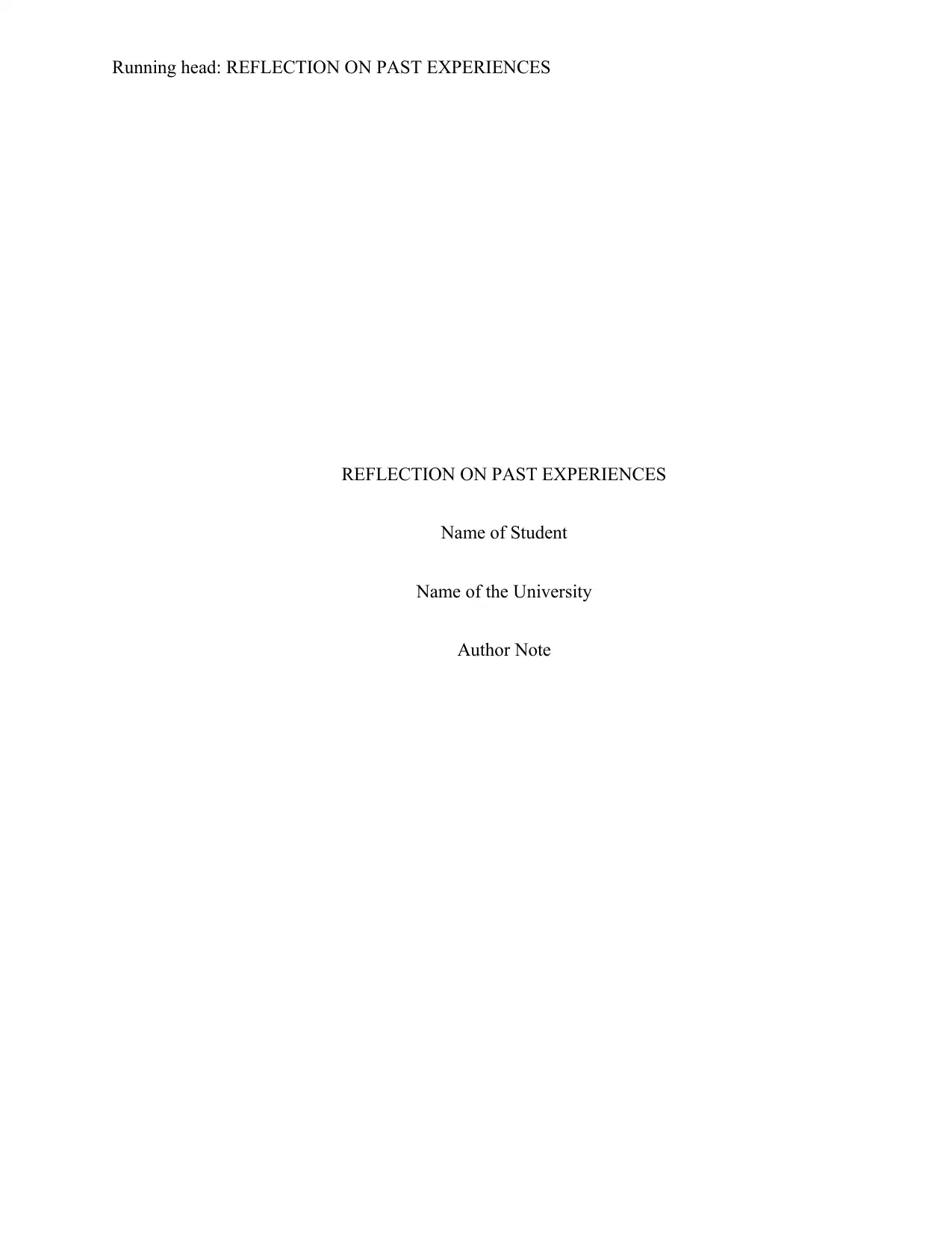
Running head: REFLECTION ON PAST EXPERIENCES
REFLECTION ON PAST EXPERIENCES
Name of Student
Name of the University
Author Note
REFLECTION ON PAST EXPERIENCES
Name of Student
Name of the University
Author Note
Paraphrase This Document
Need a fresh take? Get an instant paraphrase of this document with our AI Paraphraser
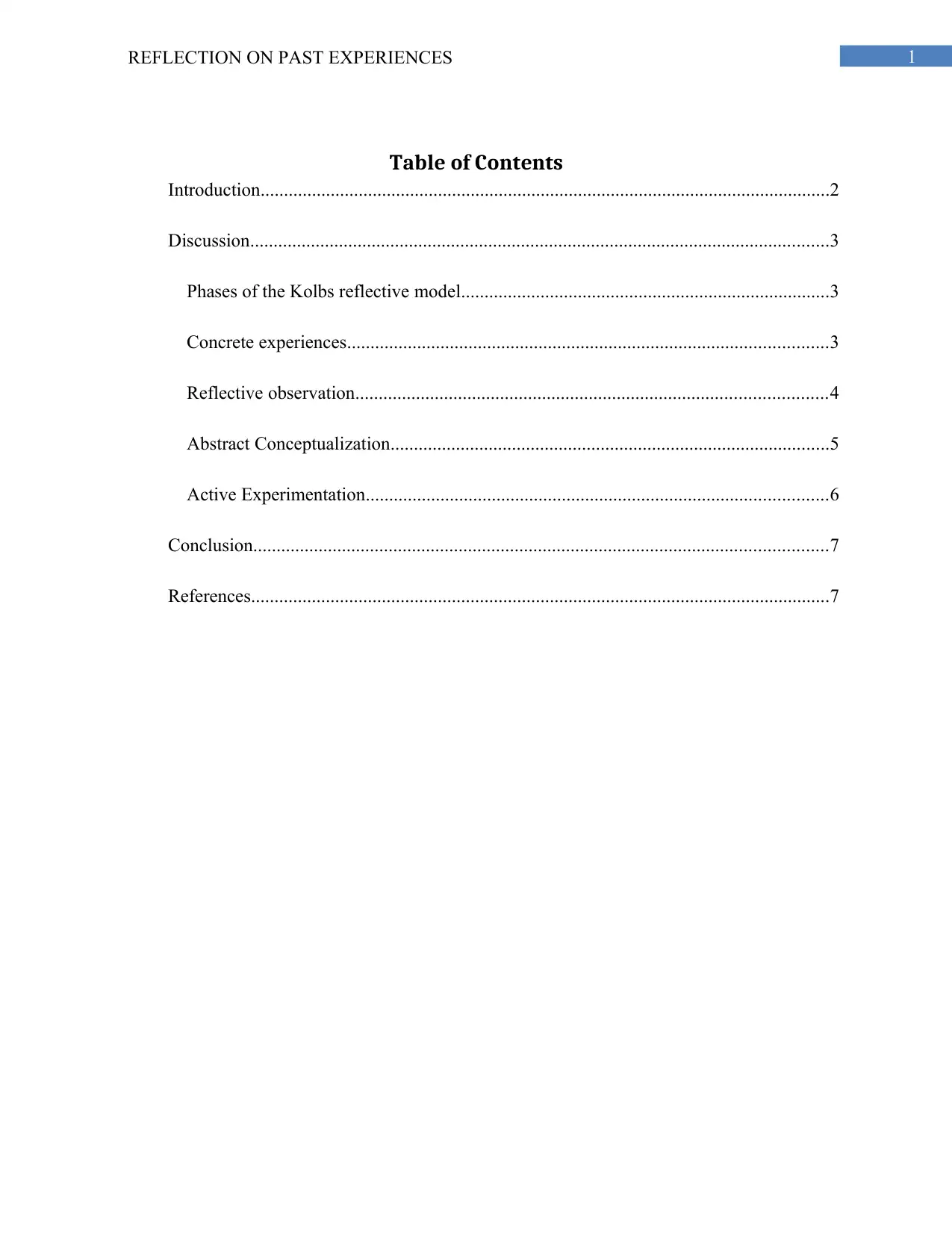
1REFLECTION ON PAST EXPERIENCES
Table of Contents
Introduction..........................................................................................................................2
Discussion............................................................................................................................3
Phases of the Kolbs reflective model...............................................................................3
Concrete experiences.......................................................................................................3
Reflective observation.....................................................................................................4
Abstract Conceptualization..............................................................................................5
Active Experimentation...................................................................................................6
Conclusion...........................................................................................................................7
References............................................................................................................................7
Table of Contents
Introduction..........................................................................................................................2
Discussion............................................................................................................................3
Phases of the Kolbs reflective model...............................................................................3
Concrete experiences.......................................................................................................3
Reflective observation.....................................................................................................4
Abstract Conceptualization..............................................................................................5
Active Experimentation...................................................................................................6
Conclusion...........................................................................................................................7
References............................................................................................................................7
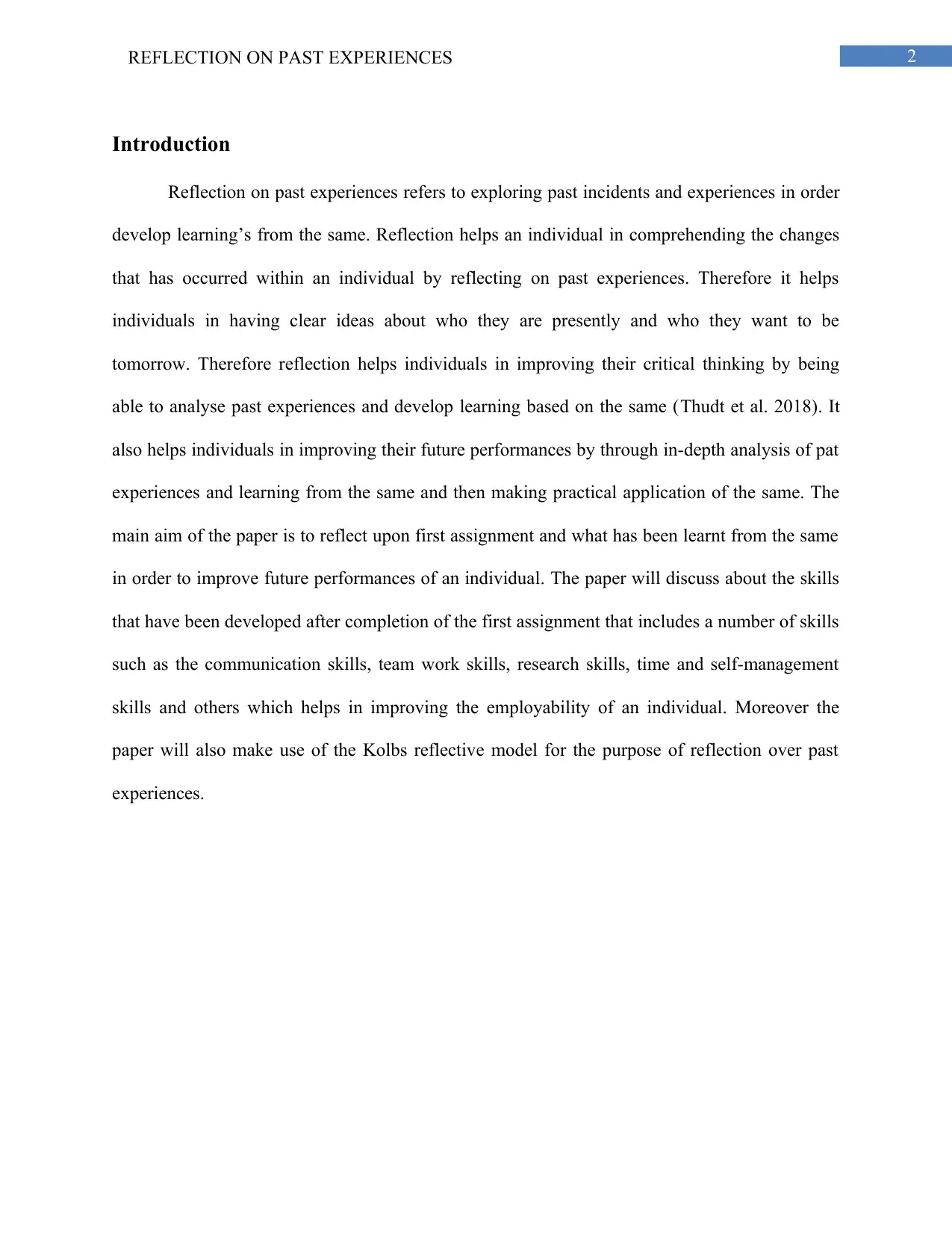
2REFLECTION ON PAST EXPERIENCES
Introduction
Reflection on past experiences refers to exploring past incidents and experiences in order
develop learning’s from the same. Reflection helps an individual in comprehending the changes
that has occurred within an individual by reflecting on past experiences. Therefore it helps
individuals in having clear ideas about who they are presently and who they want to be
tomorrow. Therefore reflection helps individuals in improving their critical thinking by being
able to analyse past experiences and develop learning based on the same (Thudt et al. 2018). It
also helps individuals in improving their future performances by through in-depth analysis of pat
experiences and learning from the same and then making practical application of the same. The
main aim of the paper is to reflect upon first assignment and what has been learnt from the same
in order to improve future performances of an individual. The paper will discuss about the skills
that have been developed after completion of the first assignment that includes a number of skills
such as the communication skills, team work skills, research skills, time and self-management
skills and others which helps in improving the employability of an individual. Moreover the
paper will also make use of the Kolbs reflective model for the purpose of reflection over past
experiences.
Introduction
Reflection on past experiences refers to exploring past incidents and experiences in order
develop learning’s from the same. Reflection helps an individual in comprehending the changes
that has occurred within an individual by reflecting on past experiences. Therefore it helps
individuals in having clear ideas about who they are presently and who they want to be
tomorrow. Therefore reflection helps individuals in improving their critical thinking by being
able to analyse past experiences and develop learning based on the same (Thudt et al. 2018). It
also helps individuals in improving their future performances by through in-depth analysis of pat
experiences and learning from the same and then making practical application of the same. The
main aim of the paper is to reflect upon first assignment and what has been learnt from the same
in order to improve future performances of an individual. The paper will discuss about the skills
that have been developed after completion of the first assignment that includes a number of skills
such as the communication skills, team work skills, research skills, time and self-management
skills and others which helps in improving the employability of an individual. Moreover the
paper will also make use of the Kolbs reflective model for the purpose of reflection over past
experiences.
⊘ This is a preview!⊘
Do you want full access?
Subscribe today to unlock all pages.

Trusted by 1+ million students worldwide
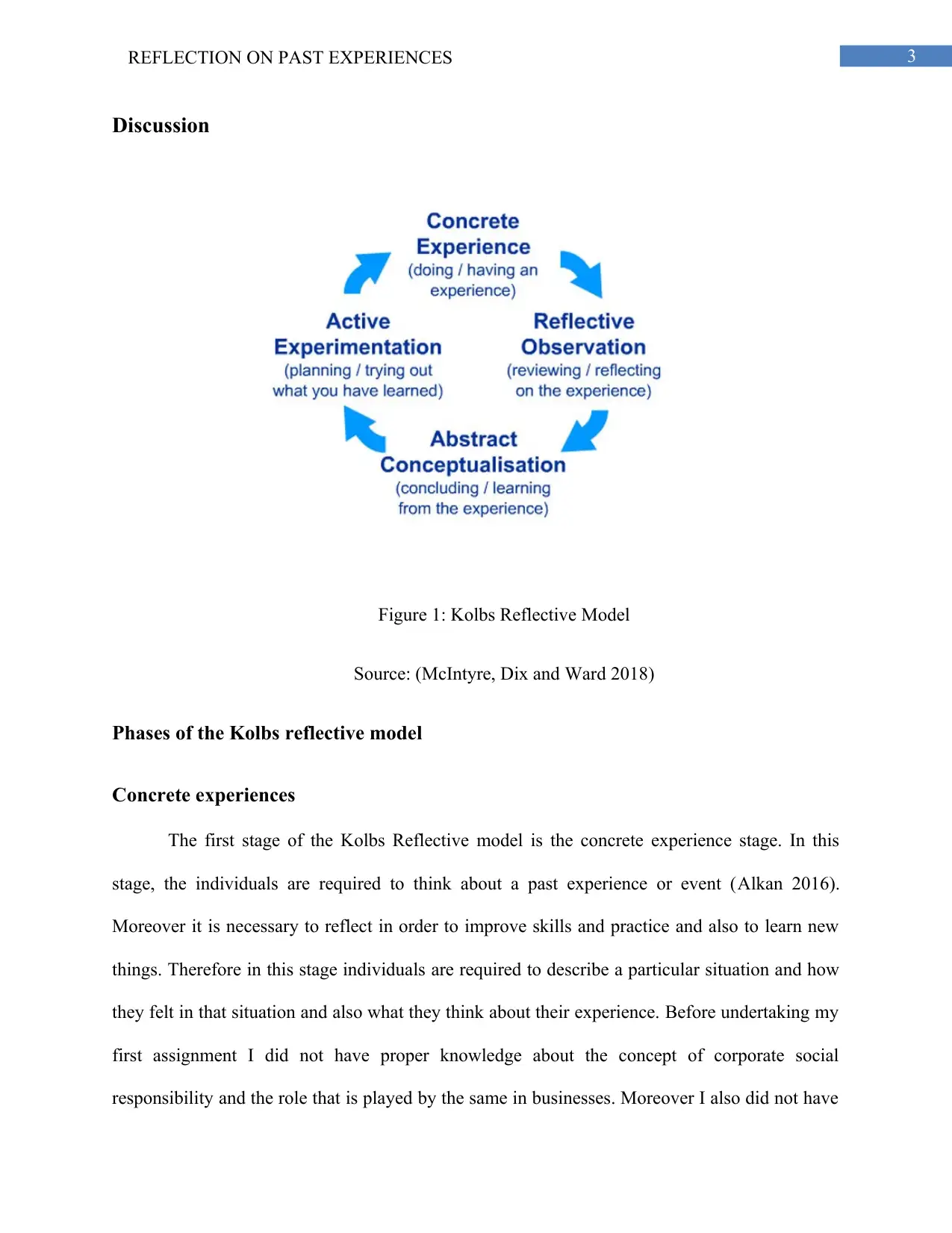
3REFLECTION ON PAST EXPERIENCES
Discussion
Figure 1: Kolbs Reflective Model
Source: (McIntyre, Dix and Ward 2018)
Phases of the Kolbs reflective model
Concrete experiences
The first stage of the Kolbs Reflective model is the concrete experience stage. In this
stage, the individuals are required to think about a past experience or event (Alkan 2016).
Moreover it is necessary to reflect in order to improve skills and practice and also to learn new
things. Therefore in this stage individuals are required to describe a particular situation and how
they felt in that situation and also what they think about their experience. Before undertaking my
first assignment I did not have proper knowledge about the concept of corporate social
responsibility and the role that is played by the same in businesses. Moreover I also did not have
Discussion
Figure 1: Kolbs Reflective Model
Source: (McIntyre, Dix and Ward 2018)
Phases of the Kolbs reflective model
Concrete experiences
The first stage of the Kolbs Reflective model is the concrete experience stage. In this
stage, the individuals are required to think about a past experience or event (Alkan 2016).
Moreover it is necessary to reflect in order to improve skills and practice and also to learn new
things. Therefore in this stage individuals are required to describe a particular situation and how
they felt in that situation and also what they think about their experience. Before undertaking my
first assignment I did not have proper knowledge about the concept of corporate social
responsibility and the role that is played by the same in businesses. Moreover I also did not have
Paraphrase This Document
Need a fresh take? Get an instant paraphrase of this document with our AI Paraphraser
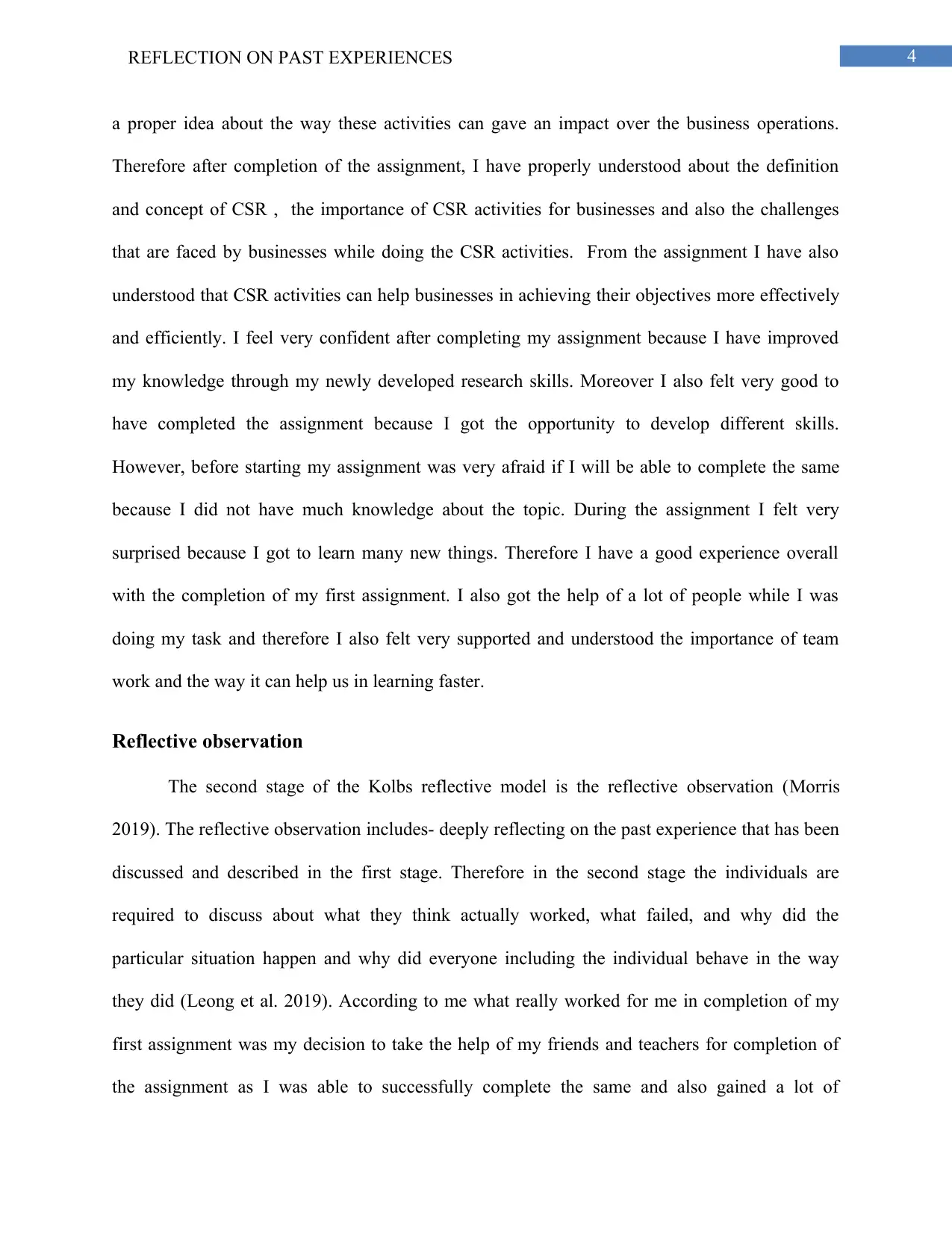
4REFLECTION ON PAST EXPERIENCES
a proper idea about the way these activities can gave an impact over the business operations.
Therefore after completion of the assignment, I have properly understood about the definition
and concept of CSR , the importance of CSR activities for businesses and also the challenges
that are faced by businesses while doing the CSR activities. From the assignment I have also
understood that CSR activities can help businesses in achieving their objectives more effectively
and efficiently. I feel very confident after completing my assignment because I have improved
my knowledge through my newly developed research skills. Moreover I also felt very good to
have completed the assignment because I got the opportunity to develop different skills.
However, before starting my assignment was very afraid if I will be able to complete the same
because I did not have much knowledge about the topic. During the assignment I felt very
surprised because I got to learn many new things. Therefore I have a good experience overall
with the completion of my first assignment. I also got the help of a lot of people while I was
doing my task and therefore I also felt very supported and understood the importance of team
work and the way it can help us in learning faster.
Reflective observation
The second stage of the Kolbs reflective model is the reflective observation (Morris
2019). The reflective observation includes- deeply reflecting on the past experience that has been
discussed and described in the first stage. Therefore in the second stage the individuals are
required to discuss about what they think actually worked, what failed, and why did the
particular situation happen and why did everyone including the individual behave in the way
they did (Leong et al. 2019). According to me what really worked for me in completion of my
first assignment was my decision to take the help of my friends and teachers for completion of
the assignment as I was able to successfully complete the same and also gained a lot of
a proper idea about the way these activities can gave an impact over the business operations.
Therefore after completion of the assignment, I have properly understood about the definition
and concept of CSR , the importance of CSR activities for businesses and also the challenges
that are faced by businesses while doing the CSR activities. From the assignment I have also
understood that CSR activities can help businesses in achieving their objectives more effectively
and efficiently. I feel very confident after completing my assignment because I have improved
my knowledge through my newly developed research skills. Moreover I also felt very good to
have completed the assignment because I got the opportunity to develop different skills.
However, before starting my assignment was very afraid if I will be able to complete the same
because I did not have much knowledge about the topic. During the assignment I felt very
surprised because I got to learn many new things. Therefore I have a good experience overall
with the completion of my first assignment. I also got the help of a lot of people while I was
doing my task and therefore I also felt very supported and understood the importance of team
work and the way it can help us in learning faster.
Reflective observation
The second stage of the Kolbs reflective model is the reflective observation (Morris
2019). The reflective observation includes- deeply reflecting on the past experience that has been
discussed and described in the first stage. Therefore in the second stage the individuals are
required to discuss about what they think actually worked, what failed, and why did the
particular situation happen and why did everyone including the individual behave in the way
they did (Leong et al. 2019). According to me what really worked for me in completion of my
first assignment was my decision to take the help of my friends and teachers for completion of
the assignment as I was able to successfully complete the same and also gained a lot of
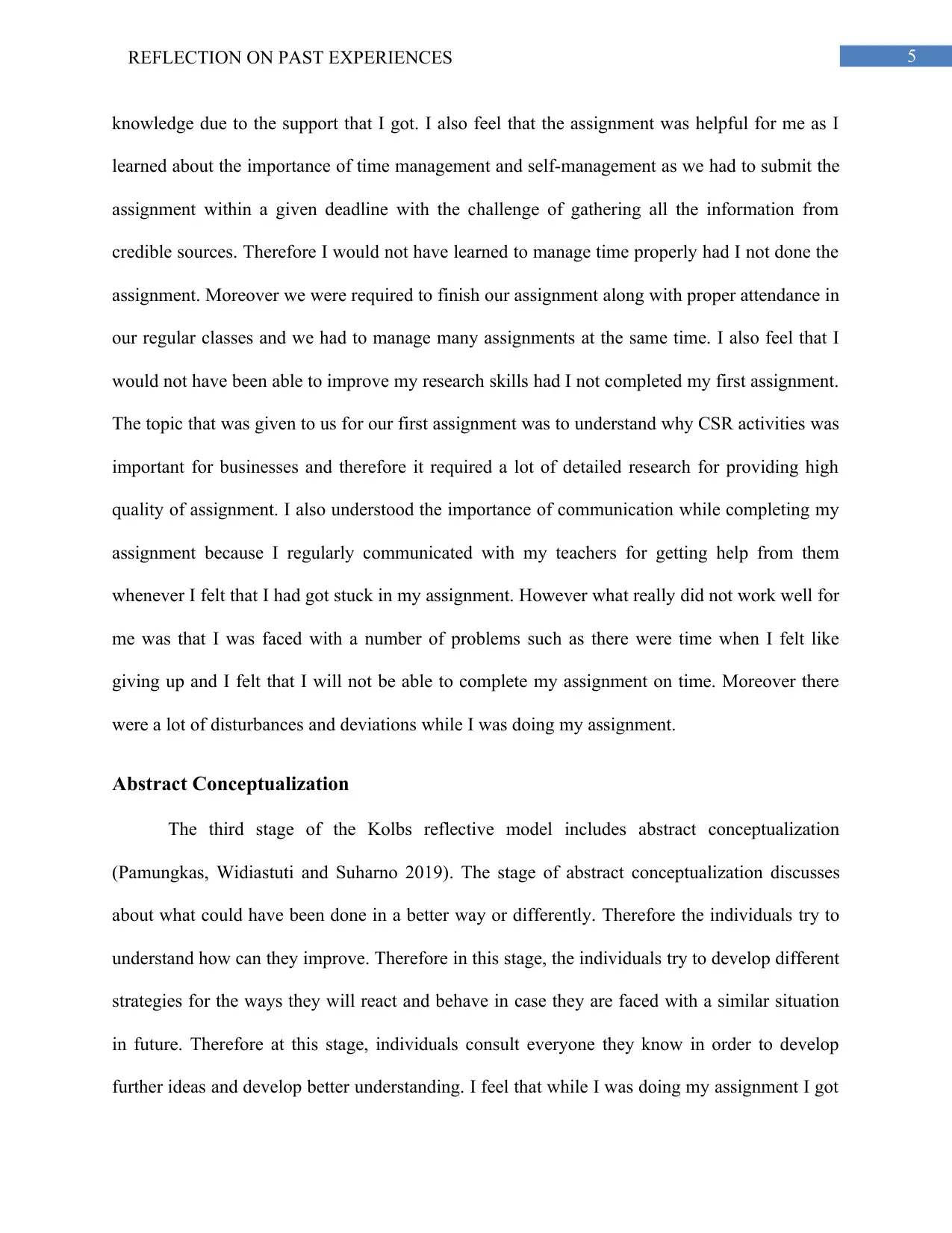
5REFLECTION ON PAST EXPERIENCES
knowledge due to the support that I got. I also feel that the assignment was helpful for me as I
learned about the importance of time management and self-management as we had to submit the
assignment within a given deadline with the challenge of gathering all the information from
credible sources. Therefore I would not have learned to manage time properly had I not done the
assignment. Moreover we were required to finish our assignment along with proper attendance in
our regular classes and we had to manage many assignments at the same time. I also feel that I
would not have been able to improve my research skills had I not completed my first assignment.
The topic that was given to us for our first assignment was to understand why CSR activities was
important for businesses and therefore it required a lot of detailed research for providing high
quality of assignment. I also understood the importance of communication while completing my
assignment because I regularly communicated with my teachers for getting help from them
whenever I felt that I had got stuck in my assignment. However what really did not work well for
me was that I was faced with a number of problems such as there were time when I felt like
giving up and I felt that I will not be able to complete my assignment on time. Moreover there
were a lot of disturbances and deviations while I was doing my assignment.
Abstract Conceptualization
The third stage of the Kolbs reflective model includes abstract conceptualization
(Pamungkas, Widiastuti and Suharno 2019). The stage of abstract conceptualization discusses
about what could have been done in a better way or differently. Therefore the individuals try to
understand how can they improve. Therefore in this stage, the individuals try to develop different
strategies for the ways they will react and behave in case they are faced with a similar situation
in future. Therefore at this stage, individuals consult everyone they know in order to develop
further ideas and develop better understanding. I feel that while I was doing my assignment I got
knowledge due to the support that I got. I also feel that the assignment was helpful for me as I
learned about the importance of time management and self-management as we had to submit the
assignment within a given deadline with the challenge of gathering all the information from
credible sources. Therefore I would not have learned to manage time properly had I not done the
assignment. Moreover we were required to finish our assignment along with proper attendance in
our regular classes and we had to manage many assignments at the same time. I also feel that I
would not have been able to improve my research skills had I not completed my first assignment.
The topic that was given to us for our first assignment was to understand why CSR activities was
important for businesses and therefore it required a lot of detailed research for providing high
quality of assignment. I also understood the importance of communication while completing my
assignment because I regularly communicated with my teachers for getting help from them
whenever I felt that I had got stuck in my assignment. However what really did not work well for
me was that I was faced with a number of problems such as there were time when I felt like
giving up and I felt that I will not be able to complete my assignment on time. Moreover there
were a lot of disturbances and deviations while I was doing my assignment.
Abstract Conceptualization
The third stage of the Kolbs reflective model includes abstract conceptualization
(Pamungkas, Widiastuti and Suharno 2019). The stage of abstract conceptualization discusses
about what could have been done in a better way or differently. Therefore the individuals try to
understand how can they improve. Therefore in this stage, the individuals try to develop different
strategies for the ways they will react and behave in case they are faced with a similar situation
in future. Therefore at this stage, individuals consult everyone they know in order to develop
further ideas and develop better understanding. I feel that while I was doing my assignment I got
⊘ This is a preview!⊘
Do you want full access?
Subscribe today to unlock all pages.

Trusted by 1+ million students worldwide
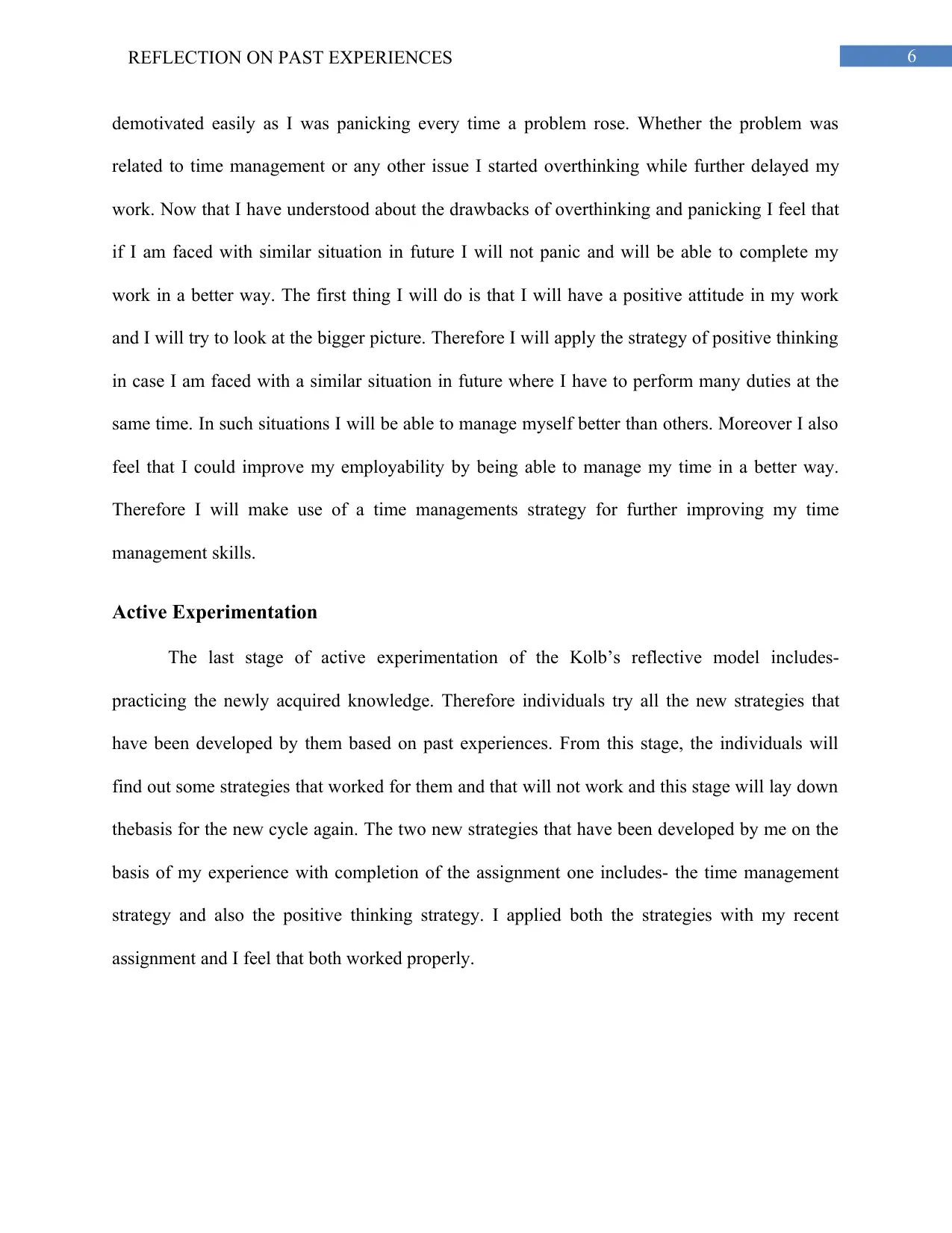
6REFLECTION ON PAST EXPERIENCES
demotivated easily as I was panicking every time a problem rose. Whether the problem was
related to time management or any other issue I started overthinking while further delayed my
work. Now that I have understood about the drawbacks of overthinking and panicking I feel that
if I am faced with similar situation in future I will not panic and will be able to complete my
work in a better way. The first thing I will do is that I will have a positive attitude in my work
and I will try to look at the bigger picture. Therefore I will apply the strategy of positive thinking
in case I am faced with a similar situation in future where I have to perform many duties at the
same time. In such situations I will be able to manage myself better than others. Moreover I also
feel that I could improve my employability by being able to manage my time in a better way.
Therefore I will make use of a time managements strategy for further improving my time
management skills.
Active Experimentation
The last stage of active experimentation of the Kolb’s reflective model includes-
practicing the newly acquired knowledge. Therefore individuals try all the new strategies that
have been developed by them based on past experiences. From this stage, the individuals will
find out some strategies that worked for them and that will not work and this stage will lay down
thebasis for the new cycle again. The two new strategies that have been developed by me on the
basis of my experience with completion of the assignment one includes- the time management
strategy and also the positive thinking strategy. I applied both the strategies with my recent
assignment and I feel that both worked properly.
demotivated easily as I was panicking every time a problem rose. Whether the problem was
related to time management or any other issue I started overthinking while further delayed my
work. Now that I have understood about the drawbacks of overthinking and panicking I feel that
if I am faced with similar situation in future I will not panic and will be able to complete my
work in a better way. The first thing I will do is that I will have a positive attitude in my work
and I will try to look at the bigger picture. Therefore I will apply the strategy of positive thinking
in case I am faced with a similar situation in future where I have to perform many duties at the
same time. In such situations I will be able to manage myself better than others. Moreover I also
feel that I could improve my employability by being able to manage my time in a better way.
Therefore I will make use of a time managements strategy for further improving my time
management skills.
Active Experimentation
The last stage of active experimentation of the Kolb’s reflective model includes-
practicing the newly acquired knowledge. Therefore individuals try all the new strategies that
have been developed by them based on past experiences. From this stage, the individuals will
find out some strategies that worked for them and that will not work and this stage will lay down
thebasis for the new cycle again. The two new strategies that have been developed by me on the
basis of my experience with completion of the assignment one includes- the time management
strategy and also the positive thinking strategy. I applied both the strategies with my recent
assignment and I feel that both worked properly.
Paraphrase This Document
Need a fresh take? Get an instant paraphrase of this document with our AI Paraphraser
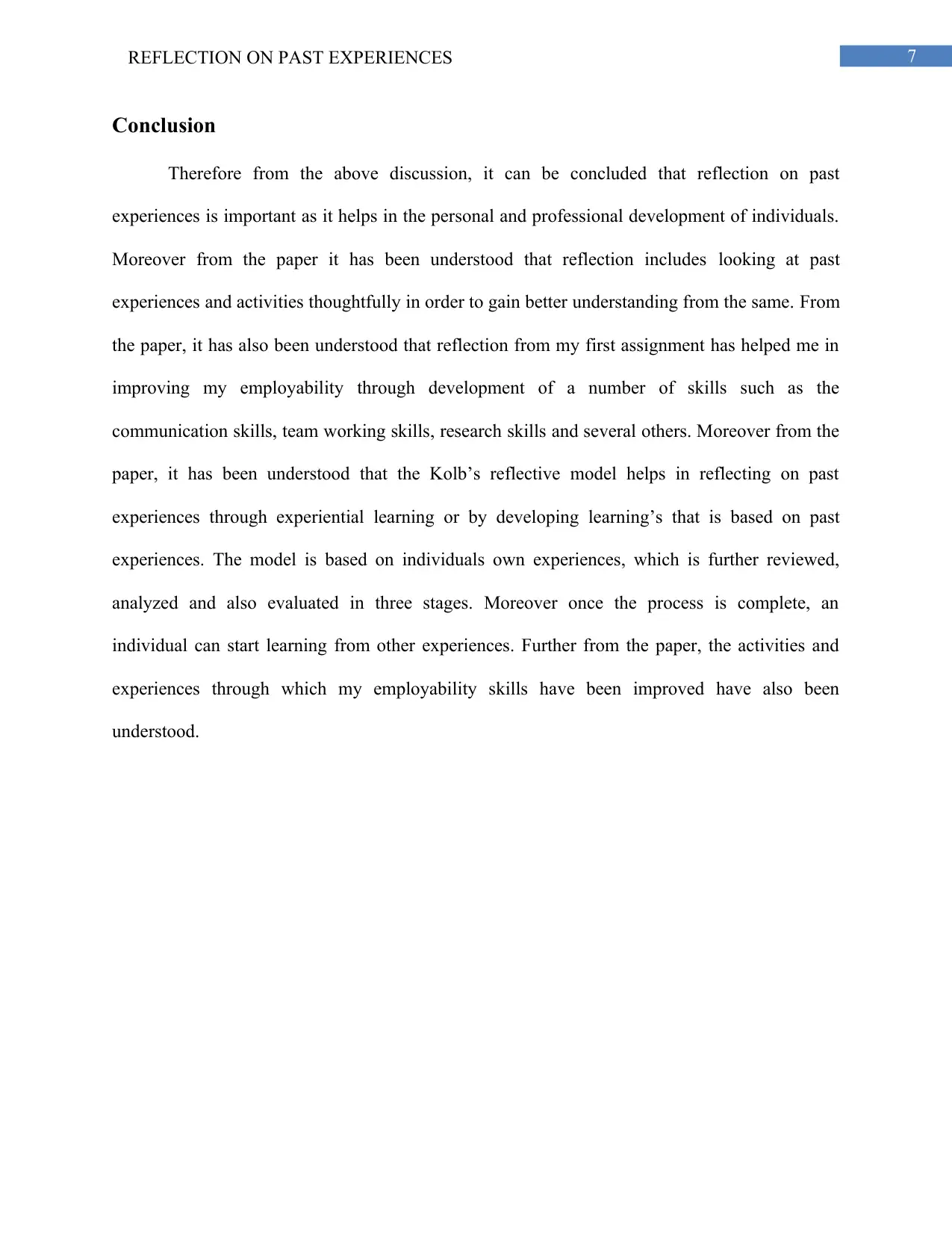
7REFLECTION ON PAST EXPERIENCES
Conclusion
Therefore from the above discussion, it can be concluded that reflection on past
experiences is important as it helps in the personal and professional development of individuals.
Moreover from the paper it has been understood that reflection includes looking at past
experiences and activities thoughtfully in order to gain better understanding from the same. From
the paper, it has also been understood that reflection from my first assignment has helped me in
improving my employability through development of a number of skills such as the
communication skills, team working skills, research skills and several others. Moreover from the
paper, it has been understood that the Kolb’s reflective model helps in reflecting on past
experiences through experiential learning or by developing learning’s that is based on past
experiences. The model is based on individuals own experiences, which is further reviewed,
analyzed and also evaluated in three stages. Moreover once the process is complete, an
individual can start learning from other experiences. Further from the paper, the activities and
experiences through which my employability skills have been improved have also been
understood.
Conclusion
Therefore from the above discussion, it can be concluded that reflection on past
experiences is important as it helps in the personal and professional development of individuals.
Moreover from the paper it has been understood that reflection includes looking at past
experiences and activities thoughtfully in order to gain better understanding from the same. From
the paper, it has also been understood that reflection from my first assignment has helped me in
improving my employability through development of a number of skills such as the
communication skills, team working skills, research skills and several others. Moreover from the
paper, it has been understood that the Kolb’s reflective model helps in reflecting on past
experiences through experiential learning or by developing learning’s that is based on past
experiences. The model is based on individuals own experiences, which is further reviewed,
analyzed and also evaluated in three stages. Moreover once the process is complete, an
individual can start learning from other experiences. Further from the paper, the activities and
experiences through which my employability skills have been improved have also been
understood.
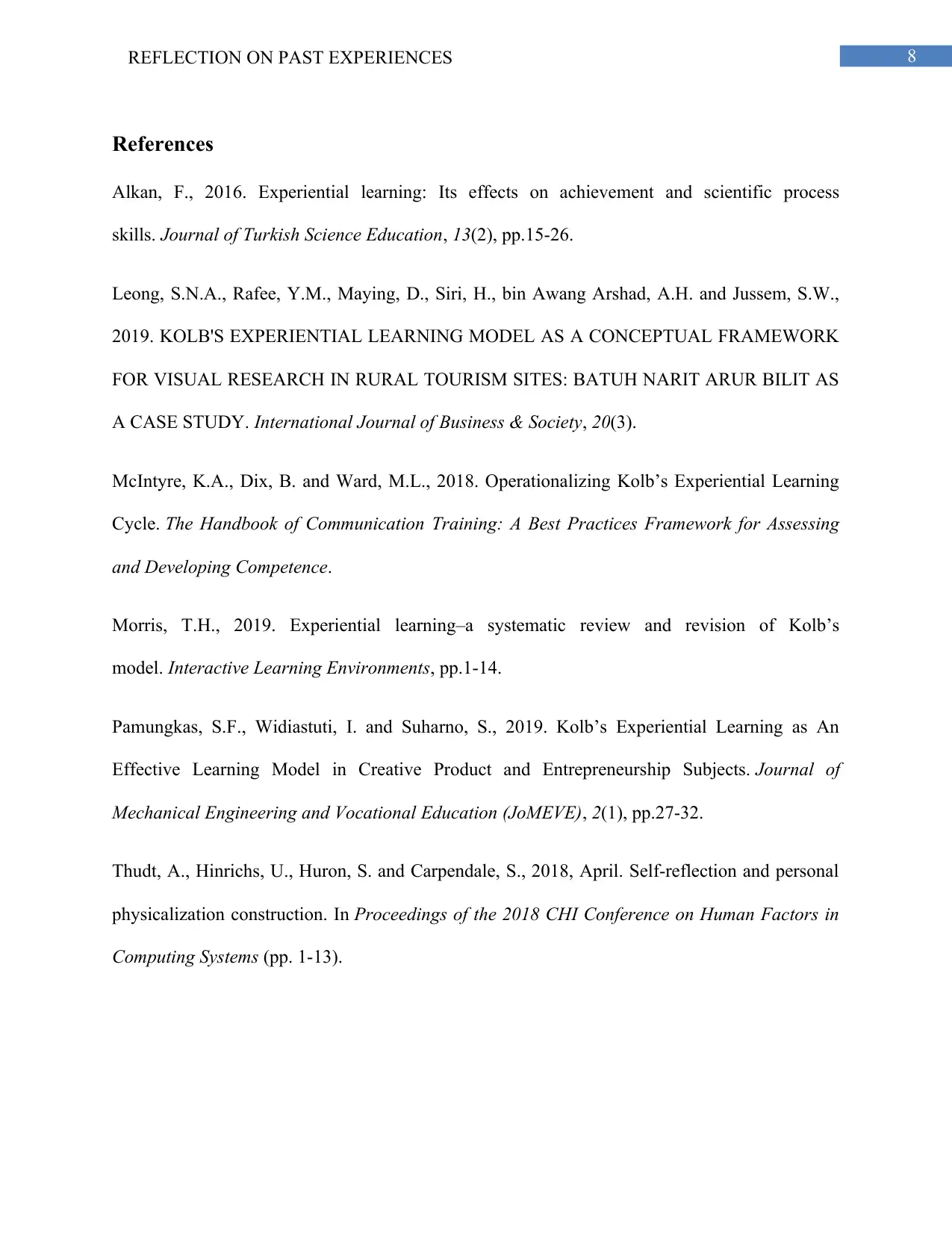
8REFLECTION ON PAST EXPERIENCES
References
Alkan, F., 2016. Experiential learning: Its effects on achievement and scientific process
skills. Journal of Turkish Science Education, 13(2), pp.15-26.
Leong, S.N.A., Rafee, Y.M., Maying, D., Siri, H., bin Awang Arshad, A.H. and Jussem, S.W.,
2019. KOLB'S EXPERIENTIAL LEARNING MODEL AS A CONCEPTUAL FRAMEWORK
FOR VISUAL RESEARCH IN RURAL TOURISM SITES: BATUH NARIT ARUR BILIT AS
A CASE STUDY. International Journal of Business & Society, 20(3).
McIntyre, K.A., Dix, B. and Ward, M.L., 2018. Operationalizing Kolb’s Experiential Learning
Cycle. The Handbook of Communication Training: A Best Practices Framework for Assessing
and Developing Competence.
Morris, T.H., 2019. Experiential learning–a systematic review and revision of Kolb’s
model. Interactive Learning Environments, pp.1-14.
Pamungkas, S.F., Widiastuti, I. and Suharno, S., 2019. Kolb’s Experiential Learning as An
Effective Learning Model in Creative Product and Entrepreneurship Subjects. Journal of
Mechanical Engineering and Vocational Education (JoMEVE), 2(1), pp.27-32.
Thudt, A., Hinrichs, U., Huron, S. and Carpendale, S., 2018, April. Self-reflection and personal
physicalization construction. In Proceedings of the 2018 CHI Conference on Human Factors in
Computing Systems (pp. 1-13).
References
Alkan, F., 2016. Experiential learning: Its effects on achievement and scientific process
skills. Journal of Turkish Science Education, 13(2), pp.15-26.
Leong, S.N.A., Rafee, Y.M., Maying, D., Siri, H., bin Awang Arshad, A.H. and Jussem, S.W.,
2019. KOLB'S EXPERIENTIAL LEARNING MODEL AS A CONCEPTUAL FRAMEWORK
FOR VISUAL RESEARCH IN RURAL TOURISM SITES: BATUH NARIT ARUR BILIT AS
A CASE STUDY. International Journal of Business & Society, 20(3).
McIntyre, K.A., Dix, B. and Ward, M.L., 2018. Operationalizing Kolb’s Experiential Learning
Cycle. The Handbook of Communication Training: A Best Practices Framework for Assessing
and Developing Competence.
Morris, T.H., 2019. Experiential learning–a systematic review and revision of Kolb’s
model. Interactive Learning Environments, pp.1-14.
Pamungkas, S.F., Widiastuti, I. and Suharno, S., 2019. Kolb’s Experiential Learning as An
Effective Learning Model in Creative Product and Entrepreneurship Subjects. Journal of
Mechanical Engineering and Vocational Education (JoMEVE), 2(1), pp.27-32.
Thudt, A., Hinrichs, U., Huron, S. and Carpendale, S., 2018, April. Self-reflection and personal
physicalization construction. In Proceedings of the 2018 CHI Conference on Human Factors in
Computing Systems (pp. 1-13).
⊘ This is a preview!⊘
Do you want full access?
Subscribe today to unlock all pages.

Trusted by 1+ million students worldwide
1 out of 9
Related Documents
Your All-in-One AI-Powered Toolkit for Academic Success.
+13062052269
info@desklib.com
Available 24*7 on WhatsApp / Email
![[object Object]](/_next/static/media/star-bottom.7253800d.svg)
Unlock your academic potential
Copyright © 2020–2026 A2Z Services. All Rights Reserved. Developed and managed by ZUCOL.




